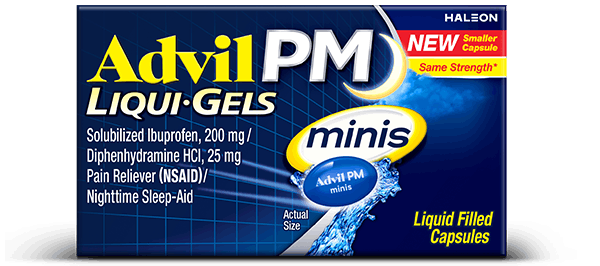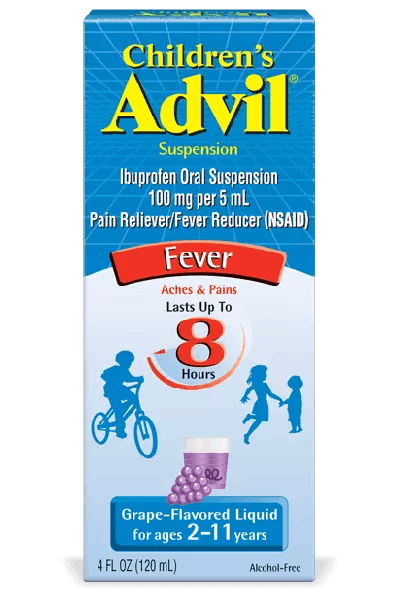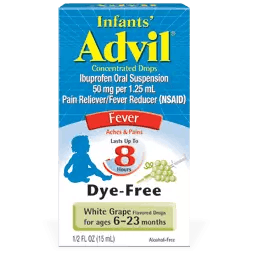Pain relievers that are regularly available at the store might be one of the first things you reach for when you have a headache, are feeling sick or otherwise need relief. Over the counter medications, and notably, non-steroidal inflammatory drugs (NSAID) can alleviate pain caused by inflammation, while also reducing fevers.1 Learn what NSAIDs are, how they work and how they differ from steroidal drugs.
What are NSAIDs?
NSAIDs are a classification of medications that help to treat or manage pain.1 Inflammation is the body’s response to pain, such as external injuries, or the presence of germs.2 Signs of inflammation include redness, heat, swelling, and pain.2 To reduce pain, NSAIDs stop your body from producing chemicals that cause inflammation.3 Specifically, NSAIDs inhibit the enzyme cyclooxygenase (COX), which make prostaglandins.3 Prostaglandins are hormone-like chemicals that cause inflammation, pain, and fever.4 NSAIDs primarily provide relief from inflammation and related symptoms, such as swelling from arthritis pain, sprains or back pain, toothaches, menstrual cramps and other symptoms and illnesses.3,4 There are several NSAID options that are available over the counter, including:3
- Ibuprofen
- Aspirin
- Naproxen Sodium
NSAIDs that are available by prescription only include:3
- Celecoxib
- Diclofenac
- Fenoprofen
- Indomethacin
- Ketorolac
NSAIDs are effective for easing pain, managing fever, relieving stiffness and other symptoms related to inflammation.3 Speak with your healthcare provider to weigh the risks and benefits of using NSAIDs.3
How do NSAIDs differ from steroidal drugs
NSAIDs primarily work by inhibiting the enzymes cyclooxygenase-1 and cyclooxygenase-2. Both enzymes produce prostaglandins, which cause inflammation, pain and fever.4 Through the inhibition of these enzymes, NSAIDS provide relief for various conditions, such as arthritis and menstrual cramps.3 Steroidal drugs tend to mimic hormones that the adrenal gland produces to fight stress associated with illnesses and injury.5 Steroidal drugs suppress the immune system and inhibit the production of inflammation and help treat:5
- Arthritis
- Asthma
- Autoimmune disorders
- Skin conditions such as eczema and rashes
- Certain kinds of cancer
Both NSAIDs and steroidal drugs effectively play a role in managing pain and inflammation.3,5 However, NSAIDs typically provide rapid relief of symptoms whereas steroidal drugs may take longer to exert their effects. 3,5 Additionally, NSAIDs are available over-the-counter and in prescription formulations, while steroidal drugs are typically available only by prescription due to their potent effects on the immune system and metabolism. 3,5
When you need quick, over the counter pain relief, NSAIDs like Advil are an effective option for pain caused by inflammation and fevers. Try Advil Liqui-Gels, which contains the NSAID ibuprofen to provide powerful relief of headaches, backaches, muscle aches, menstrual or arthritis pain, and discomfort caused by the common cold.
Are there any potential side effects or risks from NSAIDs?
While NSAIDs are generally well tolerated when used as directed, they can be associated with several potential side effects and risks, particularly with long-term or high-dose use.
Common side effects of NSAIDs include gastrointestinal issues such as stomach pain, heartburn, nausea and diarrhea.3 Prolonged use of NSAIDs can also increase the risk of peptic ulcers, gastrointestinal bleeding and perforation of the stomach or intestines.3
In addition to GI issues, NSAIDs have been associated with cardiovascular risks, including an increased risk of heart attack, stroke and hypertension, particularly in individuals with pre-existing cardiovascular conditions or risk factors.3
Other potential side effects of NSAIDs include kidney damage, fluid retention and allergic reactions. 3 Use NSAIDs cautiously and under the guidance of a healthcare professional, especially if you are an individual with a history of gastrointestinal, cardiovascular or renal issues. 3 Regular monitoring and adherence to recommended dosages can help minimize the risk of adverse effects associated with NSAID use. 3
Source Citations:
- NSAID Drugs: Uses, Side Effects, and Boxed Warnings. National Library of Medicine. https://www.ncbi.nlm.nih.gov/books/NBK547742/. Accessed 5/9/2024.
- What is an Inflammation? National Library of Medicine. https://www.ncbi.nlm.nih.gov/books/NBK279298/. Accessed 5/14/2024/
- Non-Steroidal Anti-Inflammatory Medicines (NSAIDs). Cleveland Clinic. https://my.clevelandclinic.org/health/treatments/11086-non-steroidal-anti-inflammatory-medicines-nsaids. Accessed 5/9/2024.
- COX-2 Inhibitors. Cleveland Clinic. https://my.clevelandclinic.org/health/drugs/23119-cox-2-inhibitors. Accessed 5/9/2024.
- Steroids. MedlinePlus. https://medlineplus.gov/steroids.html . Accessed 5/9/2024.








